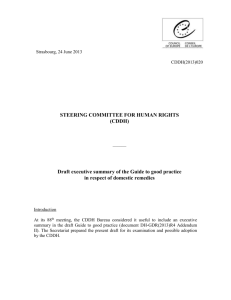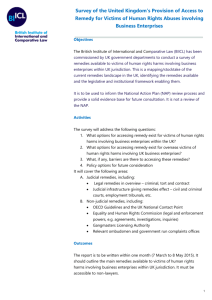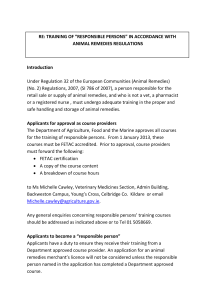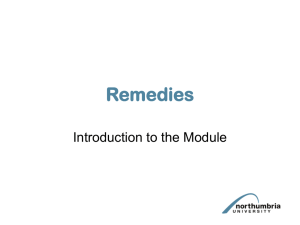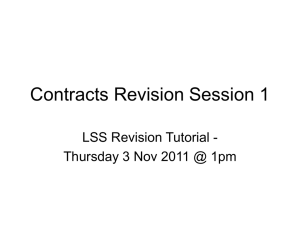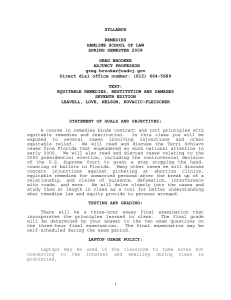Response to question 13 of the Law Commission`s consultation
advertisement
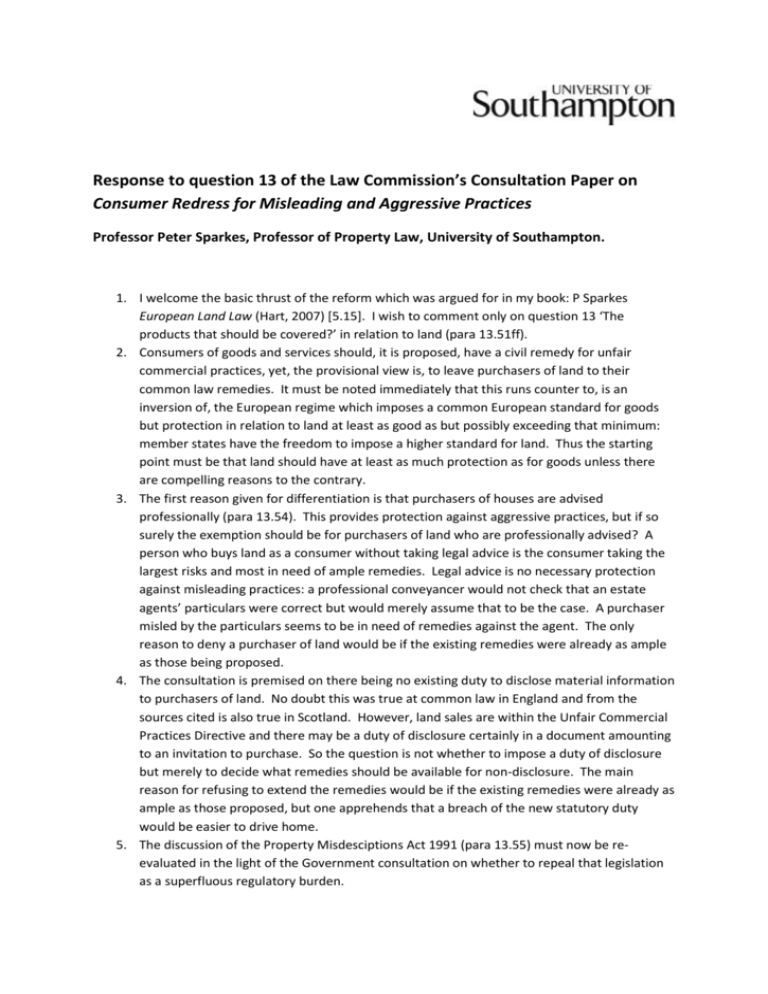
Response to question 13 of the Law Commission’s Consultation Paper on Consumer Redress for Misleading and Aggressive Practices Professor Peter Sparkes, Professor of Property Law, University of Southampton. 1. I welcome the basic thrust of the reform which was argued for in my book: P Sparkes European Land Law (Hart, 2007) [5.15]. I wish to comment only on question 13 ‘The products that should be covered?’ in relation to land (para 13.51ff). 2. Consumers of goods and services should, it is proposed, have a civil remedy for unfair commercial practices, yet, the provisional view is, to leave purchasers of land to their common law remedies. It must be noted immediately that this runs counter to, is an inversion of, the European regime which imposes a common European standard for goods but protection in relation to land at least as good as but possibly exceeding that minimum: member states have the freedom to impose a higher standard for land. Thus the starting point must be that land should have at least as much protection as for goods unless there are compelling reasons to the contrary. 3. The first reason given for differentiation is that purchasers of houses are advised professionally (para 13.54). This provides protection against aggressive practices, but if so surely the exemption should be for purchasers of land who are professionally advised? A person who buys land as a consumer without taking legal advice is the consumer taking the largest risks and most in need of ample remedies. Legal advice is no necessary protection against misleading practices: a professional conveyancer would not check that an estate agents’ particulars were correct but would merely assume that to be the case. A purchaser misled by the particulars seems to be in need of remedies against the agent. The only reason to deny a purchaser of land would be if the existing remedies were already as ample as those being proposed. 4. The consultation is premised on there being no existing duty to disclose material information to purchasers of land. No doubt this was true at common law in England and from the sources cited is also true in Scotland. However, land sales are within the Unfair Commercial Practices Directive and there may be a duty of disclosure certainly in a document amounting to an invitation to purchase. So the question is not whether to impose a duty of disclosure but merely to decide what remedies should be available for non-disclosure. The main reason for refusing to extend the remedies would be if the existing remedies were already as ample as those proposed, but one apprehends that a breach of the new statutory duty would be easier to drive home. 5. The discussion of the Property Misdesciptions Act 1991 (para 13.55) must now be reevaluated in the light of the Government consultation on whether to repeal that legislation as a superfluous regulatory burden. 6. Availability of approved redress schemes and the jurisdiction of the Property Ombudsman seem more pertinent factors. However, the availability of these schemes is not said to be a reason to remove remedies for misrepresentation. Nor is it thought relevant to consider the availability of informal redress for many transactions involving goods and services. These are vehicles for securing redress rather than methods of establishing entitlement to remediation, and the remedies awarded by informal mechanism may be more effective if they reflect a statutory entitlement to damages that is easier to prove that the grounds for a remedy in misrepresentation. 7. The second reason given for excluding land (in para 13.56) is that a distinction would be introduced between consumers and private buyers. This distinction already exists in the European framework and it would seem odd to cut across this and to differentiate between different types of consumers whose substantive rights are all European in origin. 8. Finally (also in para 13.56), it is suggested that broad brush remedies might not be suited to high value losses arising on sales of land. If this is true, and I am not quite sure I follow the logic, it suggests the need for better refinement of the remedial regime rather than its exclusion. 9. It is proposed to apply the statutory remedy to lettings but not to sales. The extremes are easy of definition, but a line is very difficult to draw in the middle. It is important in my view to catch timeshares however they might be formulated, including fractional arrangements. In order to target only rentals it would be difficult to know whether to concentrate on duration or on absence of capital value; the latter criterion would be satisfied by a freehold gift or a transaction with a right. When a particular clause is drafted it will be easier to evaluate how satisfactorily the proposed division might work. 10. A major application of the unfair practice regime will be in the context of after-sales service, meaning in this context excessive service charges. Any prophylactic effect of a professional conveyancer is exhausted when title passes and can have no impact on unfair practices by developers. A remedy in damages is desperately needed in these circumstances. The lack of cases to date merely reflects ignorance of the true reach of the European regime. A total exclusion of land would negate the potentiality of the unfair practices regime in this context. For this reason I am strongly opposed to a total exclusion of land. 11. In my opinion the neatest form of legislation would include land. If it is thought that a consumer with legal advice is not in need of protection the next best solution would be to exclude consumers of land in receipt of professional advice. Professor Peter Sparkes Southampton June 2011.
